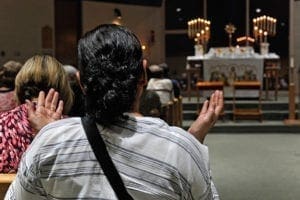It’s safer to be a fan than a follower
By P.J. EDWARDS, Special to the Bulletin | Published April 20, 2017 | En Español

Adoration of the Blessed Sacrament at St. Pius X Church, Conyers, following the Holy Thursday Mass of the Lord’s Supper April 13.
Our directive is to be followers of Jesus, but some of his actions and the results of those actions make following Jesus quite challenging. Jesus did some pretty outlandish things, and he sure did get into trouble with the religious leaders, the ruling governments and sometimes his mom. Hence, I find it tempting to be more of a “fan” of Jesus than a “follower.”
Jesus performed many acts of charity, and he clearly cared for and spent time with the poor, the marginalized and the outcast. Trying to follow Jesus in his footsteps in this regard can be challenging at times, but it is readily achievable. Plus, doing acts of charity like visiting people a government is detaining, spending time with the elderly, or working alongside the poor usually enhances one’s reputation and rarely gets a person in serious trouble. Indeed, if Jesus only did acts of charity, he would not have been arrested, tortured, condemned as a criminal and crucified. Perhaps we would have never heard of him today nor had cause to participate in this Easter season.
Jesus, however, did not limit his ministry to acts of charity. Jesus was adamantly critical of unjust structures that exploited the poor. He challenged the religious leaders and called them hypocrites. Jesus spoke of reordering political power. Jesus turned over the money tables in the temple—and within a week he was crucified.
Are we called to follow in these ways as well?
Archbishop Dom Hélder Pessoa Câmara famously said, “When I give food to the poor, they call me a saint. When I ask why they are poor, they call me a communist.”
The idea that we have some responsibility to change unjust structures in our society is not a popular topic. Yet Jesus’ example and our Catholic faith do tell us that we have a responsibility to be civically engaged and that we should measure our society by how it treats the least among us.
Many might find it surprising that Catholics have the Compendium of the Social Doctrine of The Church (available at http://www.vatican.va). Just reading the table of contents, while sounding pretty Christ-like, could be concerning to some. Our own U.S. bishops tell us that concern for how we organize our societies is a constitutive part of our Catholic beliefs (search “Catholic Social Teaching” at USCCB.org).
It seems difficult to escape that we are to participate in some of the advocacy works that make following Jesus a bit more dangerous to our popularity or perhaps other things more significant. The good news is that this concern for justice is deeply rooted, not in a political ideology, but in love. If we choose “acts of mercy” or “charity” that allow us to befriend the hungry, thirsty, stranger, naked, ill and imprisoned, our love for our friends will compel us to redress unfair aspects of our society that have worked against some of those brothers and sister among us.
This idea of advocacy springing from concern for new friends has been my experience. My parish community has become majority immigrant over a short period. While these immigrants are very capable, they are marginalized, sometimes demonized, and definitely exploited. My family has befriended many of these immigrant families, and we have learned a great deal from them.
Experiencing people you love being trapped and abused by unfair systems is quite the motivation to try to tip these systems toward justice and love. In addition to speaking with our elected representatives, another way we address social concerns is advocacy through education, dialogue and personal experience. For example, a group of us conduct immigration education sessions to explain how the U.S. immigration system operates today—which is very different from when my grandparents immigrated. We also have guided dialogue sessions between recent immigrants and U.S.-born individuals that allow participants to see complicated issues through each other’s eyes. Finally, we take groups of people to visit at immigration detention centers run on behalf of the U.S. government. Most regularly, our visitors meet with people seeking asylum after fleeing violence and poverty in their countries of origin. As part of all these events, we encourage people to consider the systems at play and share concerns that they uncover with their elected officials and their communities.
My hope for this Easter season is that others will fall in love with new friends and engage in other ways we can practice our faith by working to transform inequitable social structures to reflect the love that Christ has for each and every one of us.
P.J. Edwards is currently the managing director of an IT consulting firm. He is a founding member of the El Refugio hospitality house, the board co-chair of JustFaith Ministries, and a Detention Watch Network steering committee member. He and his family are parishioners at St. Thomas the Apostle Church in Smyrna.